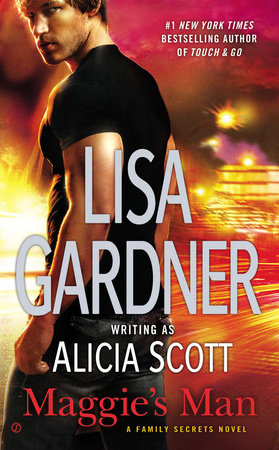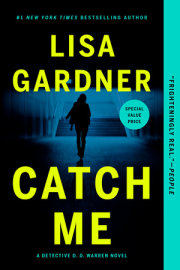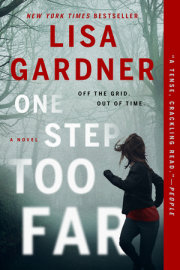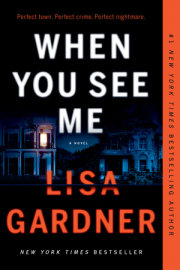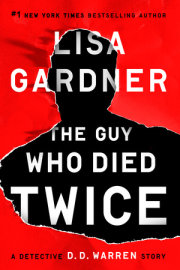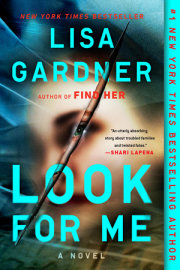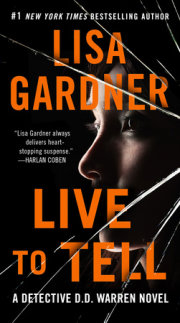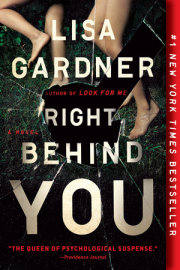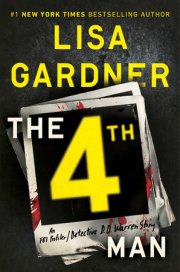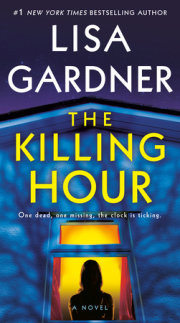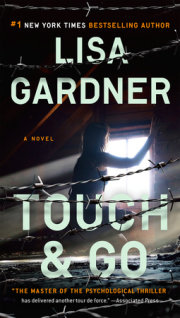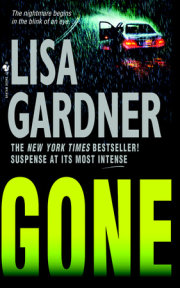“Don’t move.”
Maggie Ferringer looked up blankly from her seat on the wooden bench outside the second-floor courtroom. Eight fifty a.m. and she hadn’t had coffee yet. She was tired, disgruntled at being called for jury duty and still preoccupied with how she was going to rearrange all her appointments for the next five days. Plus, one of her cats was sick. She was thinking she’d better take him to the vet.
“Don’t move,” the prison guard repeated, and this time his voice was very hard.
She blinked rapidly, looking at the man with mild con-fusion. Strangers were always approaching her. There could be one hundred people on the street and the tourist would stop and ask Maggie for directions. She supposed it was because she was so unassuming. At five feet, she had a slight build and pale skin that only burned, never tanned. Her clothes ran toward the admittedly conservative—she had a weakness for low-slung, sensible pumps. Today, she’d matched her favorite pair of beige heels with a brown plaid wool skirt and simple pink blouse that declared, I am an intelligent, professional woman with really boring taste in clothes.
Last week, her mother—one of those tall, wildly beau-tiful women who could actually wear leopard-print jump-suits—had flown into town, greeted Maggie with two fofooey cheek kisses and dramatically exclaimed, “My God, Maggie darling! How did I ever give birth to a creature who will probably marry an accountant?”
And Maggie, who felt the same sting she always felt when trying to understand her exotic mother, had the sud-den urge to toss back her red hair and retort fiercely, “At least an accountant would come home every night for din-ner!” She hadn’t said any such thing, of course. She was still slightly surprised she’d bothered to think it. After twenty-seven years, she’d come to the realization that Stephanie would always be Stephanie. Getting angry with her self-centered, extremely un-Mom-like behavior was as productive as hating the sun for shining.
“Lady,” the guard was now growling, “I said move!”
“Move where?” she asked him politely. As far as she could tell, the second floor of the old courthouse was still deserted. Space should not be a problem for him.
Then Maggie noticed the gun. The big gun. The big black gun pointed right at her, here, in the middle of the vast gray marble hallway of the Multnomah County Courthouse. The hallway was quiet, hushed as a courthouse should be hushed—particularly one that had opened its door just five minutes before. But just one floor beneath them, she could hear the reassuring hum of people entering and the parrot-like chirp of the metal detectors working as they helped pro-tect the courthouse doors.
She stared at the gun still held unwaveringly in front of her, blinked, then stared at it again.
The prison guard abruptly jabbed her in the ribs with the barrel. Oh God, it was real. She was being attacked by a prison guard!
Maggie stopped breathing.
Hello, her mind whispered. Somebody come up here and do something. Somebody jump out and tell me I’m on Candid Camera.
The only person who moved was the prison guard.
“Do exactly what I say,” the light-haired man said, his gaze boring into hers. He shifted, positioning his solid body between her and the top of the stairs, where the first smartly dressed morning commuter was now appearing. That man was followed by a woman in a paisley-print dress, then another man in a suit.
The guard in front of her shifted again and her uni-verse was reduced to bulging biceps, a granite chest and a pair of chilling green eyes that told her he was bigger, better and badder than she would ever be in her whole entire life.
She would grant him that. She was one of those people who could never even get the lid off a pickle jar. C.J., Brandon…help!
“Listen up and don’t make a sound,” the “prison guard” commanded. His voice didn’t waver; the gun didn’t waver; his gaze didn’t waver. He exuded one-hundred-percent-focused, honed control. She was a dead woman.
“Okay.” Maggie’s gaze flew from his face to his brown uniform, to the badge on his chest. Then her eyes fell lower and she realized the shirt was too tight across his chest, the pants unbuttoned at his waist, the hems ending a good two inches above his ankles. His feet were squashed awkwardly in the shiny black boots, as if he was forced to walk tiptoe by the constraining leather.
“You’re not a prison guard!” she exclaimed softly.
The left corner of his lips twisted up. “Very good, you win the double-jeopardy question. Next time, give your an-swer in the form of a question. Now stand up and do exactly as I say.”
The gun dug into her ribs again and she jumped to her feet as if it had been a cattle prod. Her oversized beige purse promptly fell off her lap and vomited onto the floor.
“Damn!” her prison guard/captor swore. With an impa-tient gesture, he planted one broad palm on her thin shoul-der and shoved her down. “Grab it and let’s go.”
“Okay,” she said again, her fingers trembling so hard, she scrambled lipstick tubes, a set of house keys, four throat lozenges, two cat rabies tags and her checkbook all over the floor.
“Lady!”
“I don’t know what I’m doing!” she cried out perilously loud. The ringing footsteps of one man’s dress heels against the marble floor came to a suspicious halt.
The guard hunched down. One sweep of his broad hand and everything was back in her oversized leather purse. He leaned so close, she could feel his breath on her lips, as well as see the burning-green determination of his eyes.
“One more stunt like that,” he told her quietly, “and you’re dead.”
His fingers wrapped around her thin arm. He dragged her to her feet, her body pressed against him as if she were weightless. And all she could think was that her tax dollars had probably paid for the prison barbells that had made him so strong.
Her captor yanked her toward the top of the stairs. Maggie caught the gaze of a startled man in a deep gray suit still watching her. Run, yell, do something, she thought. Fingers dug into her upper arm and she smiled at the halted man instead. He politely nodded, then walked away as Attila the Hun dragged her down the rapidly flooding stair-case.
They were going against the flow of traffic, but no-body seemed to mind. The stream of humanity split around them without a second glance. Executives in their suits passed so close, she could touch them with her fingertips. One judge already in his black robe ascended the broad steps just two feet away. Court clerks in professional, but not too professional, clothes chatted about the beautiful spring weather as they moved to one side so an escaped felon could pull her down to the front doors.
Say something, do something, her mind whis-pered. Lydia always said your hair marked you as one of the legendary Hathaway Reds, and all the Hathaway Reds were women of great courage and passion. So do some-thing! Just this once, actually do something!
As if reading her thoughts, the man clamped her arm more tightly and quickened his pace. She had to half jog to keep up with his long strides. Obviously, the man not only lifted weights but ran on the prison treadmill machine. Did they give convicts StairMasters, as well, so they could climb skyscrapers as modern-day versions of King Kong? She was definitely writing a letter to her state congressman after this. Definitely, definitely, definitely.
They made the turn of the sweeping staircase. The huge bay of glass doors loomed before them, guarded by the standing metal detectors. For a moment, Maggie felt hope soar in her chest. The second he dragged her through the detectors, his gun would set them off and she’d be home free!
Then she realized the detectors were only for the people walking in. There were no such protective devices for the people walking out.
His footsteps moved even faster and she was help-less to stop the momentum.
The security desk was to her left. Three men sat there in uniform. Look over here, darn it! Hey, hey, someone set down your jelly doughnut and look at me!
But they only watched the people entering the build-ing.
Maggie rolled her eyes frantically to the right. Phones, the bank of phones. If she could twist away, make it to the phones. Her brother would help her. C.J. had joined the Marines when he’d turned eighteen and taken to it like a seal to water. He had more medals than their grandpa had gotten in World War II and Korea combined; no one messed with C.J. Or maybe her older brother, Brandon. Where was he these days? Since burying his young wife two years ago, he’d taken off and traveled the world in a manner frighten-ingly similar to their late, departed father.
She made an instinctive lunge for the phone banks. At least she thought it was a lunge. Her captor glanced at her quizzically as if she’d hiccuped, then proceeded to drag her through the broad glass doors like his own personal Raggedy Ann.
She blinked beneath the sudden glare of sunlight. A part of her was instantly relieved. It was daylight, after all, prime commute time on a bright spring day in downtown Portland, Oregon; everyone knew bad things only happened after midnight in dark alleyways where streetlights reflected off murky puddles.
Attila, however, showed no signs of slowing down. He dragged her to the corner, then came to an abrupt halt. She was so unprepared for the stop, she tripped in her low heels and practically flung herself around him. He caught her hundred-pound body, not even swaying from the im-pact. Strong hands gripped her shoulders and righted her curtly. Again, she did her impression of a blinking owl.
“Who taught you how to walk?” he muttered.
The crossing signal’s green man lit up, indicating for pedestrians to proceed. Her captor dragged her briskly across the street. Drivers watched them politely; fellow commuters rushed by hurriedly. Abruptly, Attila pushed her into the park, ducking them both behind a four-foot-high hedge. Maggie had time for one gulping gasp of air; then he pinned her between the prickly hedge and his rock-hard frame.
She blinked, then blinked again. No matter how many times she did, he remained standing before her, his steely thighs clamped around her legs.
“P-p-please,” she begged weakly. Her body began to tremble, and her eyes squeezed shut; she had no pride. She was very scared and she would do anything if this man would just let her go. “D-d-don’t hurt me...”
“Look at me.”
She had no choice. She opened her eyes to find his face looming over hers, bright green eyes hooded by thick blond brows. This close, she could see the sweat beading his forehead and upper lip. His cheeks held the faded gold stamp of old sun and the fresh pallor of a man who hadn’t been outside in a long while. His jaw appeared to have been carved from a mountain. His neck was so strong, she could see corded lines of muscle from the tense way he held his shoulders.
He didn’t look like a man who believed in compro-mise. And those lips were only an inch from hers, the clos-est any man’s lips had been in a long time.
“I don’t want to hurt you,” he said quietly.
She giggled hysterically; she couldn’t help herself. In response, he jammed the gun against her side so sharply that she hiccuped.
“Any minute now,” he continued, voice all business, “a half-naked guard is going to come running out of that court-house. You don’t want that to happen, because if that hap-pens, you’re my insurance. It’s going to be you standing be-tween a convicted murderer who needs to escape and a cor-rections officer who doesn’t want a black mark on his record. Understand?”
“Convicted murderer?”
Slowly, he nodded. “After killing the first person, the second is easy.”
She flinched, once more shutting her eyes. Faint, Maggie. Just faint and then you’ll be no good to him and he’ll leave you alone.
“Tell me where your car is.”
Her face crumpled further, the hysteria rising up in a sickening mixture of giggles and hiccups. Oh God, she was incapable of fainting. Whoever would’ve known? It wasn’t as if she was a particularly strong person. Nor was she an ad-venturesome, temperamental wild woman like her mother. She lived alone in the suburbs with two cats. These days, buying a new brand of panty hose constituted a major event in her life. Really, she thought she ought to be able to faint.
“Are you listening to me?”
“I don’t have a car. Want a bus pass instead?” She tried for a hopeful smile.
“Damn!” His voice was suddenly urgent in her ear. “Start walking. Fast!”
Her eyes popped open. Behind her she could hear a commotion. The real prison guard, she thought. He was coming out. And then she remembered what her captor had told her about her future opportunities when the real prison guard appeared. She started walking fast, her cap-tor’s hand still clenched tightly around her arm.
“Car,” he commanded again. “We need a car. I’m not lying.”
“I don’t have one,” she whispered back just as in-tently. “Honest! I took the bus! Don’t you know what traffic is like on the Sunset Highway these days?”
“Oh sure. In prison we listen to the traffic reports all the time. It would be such a shame to be caught in rush-hour traffic on our way over the wall.”
He dragged her down the street, pushing bodily through the morning pedestrian traffic. His hand was so tight around her arm, there was no way they looked like lovers casually strolling. But no one gave them a second glance as he pulled her past rapidly filling office buildings, then Star-bucks, overflowing with well-dressed caffeine junkies des-perate for a fix.
That was big-city life for you, she thought resentfully. Where was a hero when you needed one?
He yanked her into a public parking garage. “Do you have any money in your purse?”
“What?”
“Do you have money?”
“A…a little.”
“Good. You can pay for our parking.”
“But we don’t have a car.”
“We do now.” He gestured to the expanse of a second-floor parking garage filled with shiny, gleaming automobiles. She stared at him with horrified shock until he arched a single blond brow. “Did you really think I was a Boy Scout?”
“But…but stealing is wrong.”
“Uh-huh,” Attila the Hun said dryly. “We’ll take that van. Let’s go.”
He pulled her forward. She wanted to resist. She’d taken self-defense classes; she knew you should never let them get you into a vehicle. Once in the car, there would be no way to run, no way to break away. She’d be trapped as effectively as a moth pinned to a tray.
He outweighed her by a good hundred pounds. He looked to be in tremendous shape. Those arms...Heavens, he could probably pull a tractor out of the mud single-handedly. Or wrestle an ox or pin a steer. Her footsteps slowed. She tried to dig in her sensible pumps; she yanked back her arm.
He didn’t even look at her. His fingers tightened, he murmured, “Don’t be an idiot,” and dragged her forward without ever missing a beat.
He was definitely going to get her into a vehicle.
My God, Maggie, what are you going to do?
Cain selected an old, beat-up blue Dodge trade van from the late seventies. Unlocked and easy to hot-wire. He’d driven something like this way back when in Idaho. He popped open the door and peered in quickly, still clutching his insurance.
Two front seats and a gutted back that doubled as a bachelor pad. Some kid had built in a bed along one side while old milk crates lined the other, some filled with clothes, some with books. An apartment on wheels. Just the right accessory for the convict on the run.
“I’ll take it,” he murmured.
He turned back to his captive. She was the scrawni-est woman he’d ever seen, composed of ninety percent flaming red hair and ten percent skin and bones. Looking across the hallway, he’d known she was the one. She wore a plaid wool skirt from the eighties, a ruffled pink silk blouse that was even older than that and low-slung beige shoes like his grandma once wore. She didn’t even wear much jewelry, just a plain heart-shaped locket around her neck that looked old, varnished and worse for the wear. Mousy court clerk, he determined with a single glance. A woman with the spine of an invertebrate. The perfect accommodat-ing hostage, if she’d stop trembling like a leaf.
“Get in.”
Her blue eyes opened wide, peering out from the thick jungle of fiery hair. Her gaze went to the van to him to the van. He tapped his foot impatiently. He didn’t want any trouble—that was why he’d selected her. He just needed her to do what she was told. Twenty-four hours and it would all be over. He’d waited six years for this day. He’d taken a big gamble. The only way to make it work was to be willing to play it out all the way.
A man made choices. A man paid for those deci-sions. Cain had always believed that and he was willing to live with the consequences of his actions.
“Get in,” he repeated sharply, and this time his lips thinned dangerously. He didn’t want to hurt her, but he was willing to be forceful.
Mousy Court Clerk cringed at the edge in his voice. Then, rather than obeying, she peered up at him miserably through the veil of her hair.
“We can’t take this,” she whispered, then promptly hunched her shoulders.
He gazed at the spineless wonder once more. Sirens cut through the air.
“What did you say?”
Her whole body went into a shivering fit. His eyes narrowed and she shook even more. But somehow, her shoulders had set in a resilient line that did not bode well.
“We...we can’t,” she stated again, her voice soft, but dangerously firm.
The sirens sounded closer.
“Get in the van,” he ordered, and followed the words with an urgent push of his arm.
Sweat was beginning to trickle down his cheek. More than the moment when he’d actually knocked out his guard in the isolated corner of the fourth-floor Multnomah Law Li-brary, more than the moment when he’d quickly pulled on the guard’s uniform before anyone else arrived, he under-stood that he was committed now. He might have consid-ered himself a victim once; he might have considered him-self wrongly accused. But he’d just knocked a man uncon-scious. Then he’d taken a hostage. He’d crossed that line between passive victim and aggressive avenger, and if they caught him now, that was it.
The time for self-doubt and moral quandaries was over.
“But this is just some poor kid’s van,” his captive waif was exclaiming in a rush, her free hand clasping her heart-shaped locket. “And this is just some poor kid’s van. I mean...look at it. It’s probably his home, his life. I bet it’s not even insured. Does it look insured to you? You steal this and you’ve...you’ve taken someone’s whole life—his clothes, his books, everything. You can’t do that—it’s just...just...”
“Cruel?” he supplied expressionlessly.
She looked at him with huge blue eyes, then slowly nodded. “Can’t you...can’t you steal a nice insured car? Please?”
He stared at her. She was obviously near hysteria—for God’s sake, they could probably hear her knees knock-ing together in China—but she didn’t look away. And she didn’t get into the van.
This woman had just been taken hostage by an armed, escaped felon, and she was worried about some kid’s future? Great, Cain. You just managed to kidnap the one woman in the courthouse who’s mentally unbal-anced. Good job.
The sirens came to a squealing halt just three blocks away. That decided the matter.
“Get into the van or I’ll shoot you. Those are your op-tions.”
She scrambled into the van, climbing awkwardly over the seats and landing with an uncoordinated plop on the passenger’s side. He hefted himself in easily, looking at the gun, then at the ignition he needed to hot-wire. He would need two hands. He would need to move fast.
The police were so close. Keep calm, Cain. Keep moving. Life is nothing more than a game of chess.
He glanced in the rearview mirror, rapidly contem-plating his next steps. He saw the parking garage, which was still empty. Then his gaze shifted to the makeshift bed and the crates filled with books and clothes in the back of the van.
He’d lived out of a truck once. When he’d first come from Idaho to Oregon, driving into Portland and so deter-mined to make something out of himself. He’d had nothing. Just his old truck and the makeshift bed in the back. He used to eat raw frankfurters for dinner; they were all he could afford. But he hadn’t minded; he’d lived his whole life up till then in a plywood shack, so he had no expectations of luxury. And the truck meant he was free, that he’d gotten out of the hills, that he had a chance to see the cities his mother used to tell him about, softly, when his father wasn’t in the cabin.
If someone had stolen his truck then, what would it have done to him? How much would it have convinced him that maybe his father was right and the whole world was out to get him? How much would it have convinced him that there was nothing worth fighting for after all?
Damn. Damn damn damn.
“Get out of the van,” he ordered crisply, and was al-ready climbing down.
His hostage looked at him with unabashed relief. “Maybe there’s hope yet,” she murmured, then immediately clamped her lips shut when she realized the words had been spoken out loud.
He dragged her from the van, more than a little bit on edge. He could hear other sirens approaching in the dis-tance. He was playing Good Samaritan and the entire city was being cordoned off. Smart, Cain, smart.
He pulled her bodily to a newer, sleek pickup truck. He’d grown up with trucks and he valued their off-road abili-ties. If the going got tough, this baby looked like it could take him down the Grand Canyon and back up the other side. Probably insured. He peered in at the gas gauge. Almost full. Perfect.
He popped open the unlocked door. In Portland, people were still trusting. He didn’t want to dwell on that or what it made him. Prison did change a man, even when he swore it wouldn’t.
“Get in,” he told his captive for the fifth time. She hesi-tated and he whirled on her abruptly, thrusting the gun be-neath her chin as she froze like a pillar of salt. Her eyes wid-ened; her breath sounded loud and labored in the concrete drum of the garage. He could feel her terror like a palpable presence. He could see the blue pulse point at the base of her neck pound furiously. Sweat beaded up on her pale oval face and slowly trickled down.
Don’t push her too hard, he thought, but he didn’t relent.
“Listen to those sirens,” he whispered against her cheek. “They’re not playing ‘Where’s Waldo?’ I want you to get into that truck. I want you to do everything I say. If you cooperate, I won’t hurt you. You have my word. The deci-sion is yours.”
He stepped back, but his eyes remained hard.
“All right,” she whispered immediately. Her gaze re-mained locked on him warily as she turned her body toward the high truck. She tried valiantly to lift her skirt-hampered leg up to the looming step. It wasn’t going to happen. She was too short and it was too high. With a burst of impa-tience, Cain planted his hand firmly on her butt, ignored her squeak of indignation and tossed her up onto the bench seat. She went sprawling, landing with a lewd spread of creamy white thighs. He disregarded the flashing white limbs and climbed in after her, filling the truck doorway.
With another yelp, she scrambled to the opposite side, crossing her legs and pressing her skirt around herself like a mortified nun.
“Don’t worry,” he said tersely. “I’m trying to escape from jail, not molest a child.”
“I’m not a child!” she said, and for a moment sounded wounded.
“Uh-huh.” He turned his attention to hot-wiring the truck.
But there was no way he could do that and hold a gun on her. Worse, the sirens continued to wail with in-creasing fervor just a few blocks away. For one moment, he felt the dark spiraling panic of a man watching events twist out of his control. He squelched the feeling instantly, his fin-gers drumming on the steering wheel as his mind frantically sought solutions.
He’d never escaped from jail before. He’d never taken a hostage before. He didn’t know what he was do-ing...
Stop it! No panic, no fear. Life is a chess game, and if there was one thing you were very good at, Cain, it was chess.
His hands steadied. The worst that could happen was that he would fail—that his brother would find him and that his brother would kill him. He was willing to take that risk; he was willing to pay that price. There were very few things he believed in anymore. Freedom of choice was one. The absolute value of truth was the second.
You waited six years for this, Cain. Either do it or bow your head and return to your cell.
There was no way he was willingly returning to prison. Besides, it was only a matter of time before the Ar-yan Brotherhood finally succeeded in having him decom-missioned. If he was going to die, he wanted to die as a man, not as prisoner number 542769.
He set the gun between himself and the driver’s-side door. Then, while the court clerk stared up at him with wid-ening eyes, he pulled out the handcuffs.
“What’s your name?”
“M-Maggie. What are you doing?”
“I’m handcuffing us together, Maggie.”
“No!” She clutched her hand to her side. “You can’t keep doing this. You can’t take me hostage. I...I have de-pendents!”
He actually froze for a minute. “Kids?” he asked slowly. He didn’t want to know this. He really didn’t want to know this.
“Cats,” she whispered.
“What?”
“I have cats,” she continued in a rush. “Two cats and I live all alone and there’s no one to feed them. One of them has been sick lately. And...and Friday has only three legs—”
“What?”
“She has only three legs. She was born that way—it makes her very high-strung. If you don’t feed her at exactly the same time every day, she throws these fits. I really wor—”
He reached over, clasped her wrist and slapped the handcuff around it. While looking at her steadily, he slipped the cuff around his wrist. “Maggie, you’re now a hostage, not a pet owner.”
She stared at him miserably, her eyes welling up.
“Don’t!” he said immediately. “Don’t do that.”
“Do what?” Her chin began to tremble.
“No! No crying. I forbid it!”
“Okay,” she whispered, and a single tear streaked down her cheek. Then another and another. Big, silent tears that tangled in her long red hair.
He stared at her as she wept soundlessly, turning her head away from him. “Crying is bad,” she muttered. “Don’t cry, don’t cry.” Her hand abruptly closed around the old locket around her neck, her fingers shaking.
Cain’s mouth opened. Something twisted deep in his gut. She looked small, defenseless. There was something about her, an innocence, he supposed. It had been a long time since he’d encountered innocence; he didn’t know how to treat it anymore.
He should let her go. This was a bad idea.
Except there was no way he was going to make it out of the city without being caught, and if he was caught a hos-tage was his only bargaining chip. If he let her go, he might as well return to prison now. And if he returned to prison, no one would ever learn the truth about that dark, bloody night six years ago.
A man did what a man had to do. Twenty-four hours from now, he’d let her go and she’d never have to see him again. This event would become a dull memory. She would survive. Her odds, at least, were better than his.
“Move,” he said abruptly, and popped the truck door open. He started sliding out, and since he outweighed her by eighty pounds, she had no choice but to follow.
“Where are we going?” She’d composed herself. Her tears were gone; just a faint hoarse edge remained in her voice.
“Back to the van.”
“But I thought you weren’t going to steal the van.”
“Relax. I want his clothes.”
He slid back the side door forcefully, hopped in and dragged her with him. She stumbled, of course, tilting them both dangerously. He righted them, then turned his attention to the clothes. Not much time.
He flipped over a milk crate and rapidly perused his options. Shirts, jeans, socks, a pair of worn-out tennis shoes. A black baseball cap with “Oregon State University” scrawled across the front in orange. Size was feasible, too. A little too large but that was preferable to too small. Good.
He set the gun down on the bed, far out of Maggie’s reach. Then he began unbuttoning the ill-fitting guard uni-form.
“What are you doing?” she choked.
“Changing.”
“You can’t do that!”
He gazed at her expressionlessly, his fingers moving down until they reached the last button at his waist. The shirt opened, revealing his naked chest. And Maggie blushed six different shades of red.
“Did you grow up in a nunnery?” he asked, shrugging off the shirt. It remained dangling over the handcuffs.
“No.” Her voice was so strangled he could barely hear the word.
“Just checking.”
He grabbed the cotton-blend uniform from where it hung on the chain between their wrists and gave a small yank. The material ripped off like meat falling from a bone.
Maggie’s eyes grew round as saucers.
“My tax dollars,” she muttered, staring at the torn shirt, then his bare torso, which rippled and flexed like a marble statue.
“Probably.” He’d used the one-hour rec time he re-ceived every day as a maximum-security inmate to work out. Being surrounded by two-ton murderers and rapists had that effect on a man.
His hands moved purposefully to his waist. Maggie promptly squeezed her eyes shut. For a moment he hesi-tated, his upbringing warring with his circumstances. The handcuffs, however, limited the amount of distance he could put between the two of them. She cracked open her blue eyes as if to see what was holding him up, looking miser-able and forlorn.
“All right,” he said abruptly. He acted quickly, before he could debate the wisdom of his decision yet again. With one deft movement, he picked up her wrist, unlocked the metal bracelet and dropped her freed hand to her side. “Move, and I’ll shoot you.”
“I want to go home,” she whispered.
His lips twisted slightly; some of the force went out of his stance. “I know,” he said quietly. “I know.”
He turned away. Briskly, he peeled off the ill-fitting prison guard pants and kicked them away. Then he pulled up the new pair of jeans. Moving fast, he donned a worn T-shirt with a blue-striped short-sleeved overshirt. With his fingers, he impatiently raked back his blond hair, momentar-ily revealing the port-wine stain riding high on his forehead that had earned him his name from his father. His mother had tried to argue that Cain was no name for a child, but she never had been a match for her fierce, hardhearted husband.
Cain pulled the baseball cap low and completed the transformation from state prisoner to prison guard to Joe Blow in fifteen minutes or less.
He picked up the gun, locked the safety and slid it into the waistband of the loose-fitting jeans, the dark pistol covered by the overshirt. Then he retrieved the handcuffs and slapped them into place on their wrists once more.
“All right, Maggie. Now we hot-wire the truck.”
Her blue eyes rose silently, no longer desolate but resigned. “When my brothers catch up with you, you’ll regret having ever done this,” she informed him softly.
“Yeah?” He dragged her out of the van.
“C.J.’s a Marine. Force recon. He’s invented new ways of handling men like you.”
They were back at the pickup truck. He held open the door. “After you.”
“And Brandon is just plain dangerous. You think he’s just an investment banker, but then you see his eyes. He’s very focused, very intelligent, and knows exactly how to get what he wants. He’ll have you in line for lethal injection by morning.”
“My brother, Abraham, cut his teeth on a Remington twelve-gauge shotgun, Maggie. With a crossbow, he can shoot a hole through the middle of a quarter from forty yards. He also believes the numbers on the back of the road signs are to help the Zionist Occupational Government—ZOG—someday herd all dissidents into forty-three concentration camps and that Gurkha troops are being secretly trained in Montana to attack and disarm God-fearing Americans such as himself. If he finds us, Maggie, he’ll kill us both.” His lips twisted, but the expression couldn’t be called a smile.
“Concentration camps?” she whispered sickly.
“Welcome to Paranoia-R-Us. Or in Idaho, another name for the militias. Up you go.” He slid his hands beneath her arms, intent on hefting her up into the cab and hearing her drag in another sharp hiss of outrage. She shifted to get away from him, but only succeeded in pressing one small breast against his palm. Firm breast, apple shaped. Soft. Beautifully, delicately soft. Definitely the breast of a woman and not a child.
His breath held. Her breath held. Her eyes widened in terror, and very slowly, she edged back. His breath came out hard and low.
“Maggie,” he said in a low, measured tone, “I haven’t had sex in six years. Don’t do that again unless you mean it.”
“Okay,” she squeaked.
He smiled, cursing his body, her shyness and the whole situation. Next time he escaped from prison, he was kidnapping a prostitute or a very eager widow.
With a sudden, deft movement, he tossed Maggie up into the truck, away from his hand and the swelling that was becoming almost painful against his jeans. The binding link of the chain, however, forced him to follow her up awk-wardly.
He grabbed the gun and vented his frustration by us-ing the handle to break open the ignition. Sixty seconds later, the truck roared to life with the sleek growl of an ex-pensive lion.
Thank God for misspent youths. The tension began to dissolve. He was going to do this. He was going to get away. It would all work out if he just kept thinking.
“Sit next to me, Maggie.”
“No.”
He smiled and, with a negligent yank of his sinew-roped forearm, dragged her against him. “Sit here, sweet-heart,” he murmured. “Look at me affectionately. Place your hand on my thigh. And when the police look over at us to check for an escaped con in a prison guard’s uniform, smile at them sweetly and say you have no idea but you’ll certainly keep your eyes open. It’ll be very easy, very simple. And in no time at all, I’ll return you unharmed and untouched to your three-legged cat.”
She stared at him, her eyes unexpectedly mutinous. Her red hair tangled wildly around her pale features, while her lips parted with stubborn defiance.
She looked suddenly vital and stunning.
He figured six years was definitely too long to go without a woman if he thought a thin scrap of female like her was stunning.
“What are you thinking, Maggie?” he whispered. “What can you really do against someone like me?”
Her mouth abruptly shut. The light died in her eyes. She slumped beside him, and that quickly she was the mousy clerk again. It was as if a switch had been thrown and the woman simply turned off.
“Okay,” she said.
He gazed at her a minute longer. She didn’t look up, and there were no more signs of life in her face. He nodded finally. It was better this way.
He shifted the truck into gear and backed out of the lot. Casual and easy, that was the ticket. If they appeared calm, no one would ever guess they had something to hide.
“Where are we going?” she asked at last, her blue eyes fastened on the dash.
“To Idaho,” he said lightly. “We’re going to find my brother, Ham. Then I’m probably going to have to kill him.”
Copyright © 2013 by Lisa Gardner. All rights reserved. No part of this excerpt may be reproduced or reprinted without permission in writing from the publisher.

